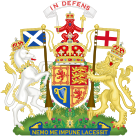| Act of Parliament | |
 | |
| Long title | An Act of the Scottish Parliament to abolish the feudal system of land tenure; to abolish a related system of land tenure; to make new provision as respects the ownership of land; to make consequential provision for the extinction and recovery of feuduties and of certain other perpetual periodical payments and for the extinction by prescription of any obligation to pay redemption money under the Land Tenure Reform (Scotland) Act 1974; to make further provision as respects real burdens affecting land; to provide for the disentailment of land; to discharge all rights of irritancy held by superiors; to abolish the obligation of thirlage; to prohibit with certain exceptions the granting of leases over land for periods exceeding 175 years; to make new provision as respects conveyancing; to enable firms with separate personality to own land; and for connected purposes. |
|---|---|
| Citation | 2000 asp 5 |
| Introduced by | Jim Wallace[1] |
| Territorial extent | |
| Dates | |
| Royal assent | 9 June 2000[2] |
| Commencement | 9 June 2000[3] |
| Other legislation | |
| Repeals/revokes |
|
| Relates to | |
Status: Current legislation | |
| History of passage through Parliament | |
| Text of statute as originally enacted | |
| Revised text of statute as amended | |
The Abolition of Feudal Tenure etc. (Scotland) Act 2000 was a land reform enforced by an Act of the Scottish Parliament that was passed by the Scottish Parliament on 3 May 2000, and received Royal Assent on 9 June 2000.[4]
YouTube Encyclopedic
-
1/3Views:1 047418328
-
Ground rent
-
Industrial Revolution | Wikipedia audio article
-
The Industrial Revolution | Wikipedia audio article
Transcription
Provisions
The Act officially brought to an end annual feu duties, a vestige of feudal land tenure, on 28 November 2004 (that is, Martinmas, as the Act required the "appointed day" to be one of the Scottish term days). Tommy Sheridan was one of a number of MSPs who drove this change through the Scottish Parliament. After that date, the former vassal of an estate was the sole owner of the land, and the former superior's rights were extinguished. For a further two years, the superior had the option of claiming compensation; this was fixed at a single payment of a size that, when invested at an annual rate of 2.5%, would yield interest equal to the former feu duty. Because inflation had eroded the value of duties, which had been fixed many years before, this payment was in most cases extremely small compared with the current value of the land.
In consequence of this change in the legal basis of land-holding, the Act also reformulated the legal basis on which conditions on the use of land can be specified in the title to ownership of that land. Such title conditions (known variously as real burdens and real conditions in the prior law) were combined into "real burdens". Prior to the Act, a superior could choose to enforce title conditions, or grant a consent or waiver (usually for payment) allowing the land owner to disregard the condition even if otherwise neighbouring property owners might wish to enforce the condition. Existing conditions which were enforceable only by the superior were abolished, and only conditions enforceable by the owners of neighbouring property or by certain legal bodies on public policy grounds were retained. Transitional arrangements allowed superiors who were also neighbouring property owners to convert the old title conditions to benefit their land and hence themselves as owners of that land rather than themselves as feudal superior.
Following this change in the legal basis for title conditions, the Title Conditions (Scotland) Act 2003 was passed, reconstituting the mechanics of how new real burdens and servitudes could be created. These two Acts, together with a third Act (the Tenements (Scotland) Act 2004), commenced on 28 November 2004.[5]
See also
References
- ^ "Abolition of Feudal Tenure etc. (Scotland) Bill [AS INTRODUCED]" (PDF). parliament.scot. The Scottish Parliament. p. 112. Retrieved 17 October 2016.
- ^ "Session 1 Bills". parliament.scot. The Scottish Parliament. Retrieved 17 October 2016.
- ^ "Abolition of Feudal Tenure etc. (Scotland) Act 2000,Section 77: Short title and commencement". legislation.gov.uk. The National Archives. Retrieved 17 October 2016.
- ^ "Abolition of Feudal Tenure etc. (Scotland) Act 2000". www.opsi.gov.uk. Archived from the original on 21 July 2009. Retrieved 2 August 2009.
- ^ "Age-old Scots property rights end". BBC News. 28 November 2004.
External links
Legislation
- Abolition of Feudal Tenure etc (Scotland) Act 2000
- Text of the Abolition of Feudal Tenure etc. (Scotland) Act 2000 as in force today (including any amendments) within the United Kingdom, from legislation.gov.uk.
Literature
- Andrew J. M. Steven: "Revolution in Scottish Land Law Archived 7 April 2013 at the Wayback Machine" in: Electronic Journal of Comparative Law 8.3 (October 2004)
- David Sellar: "Farewell to Feudalism" in: Burke's Landed Gentry of Great Britain: The Kingdom in Scotland. Edited by Peter Beauclerk Dewar. Wilmington, DE 192001, pp. xix - xxi
